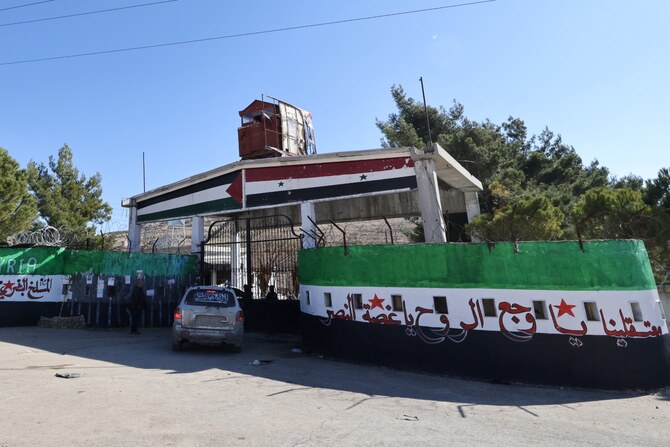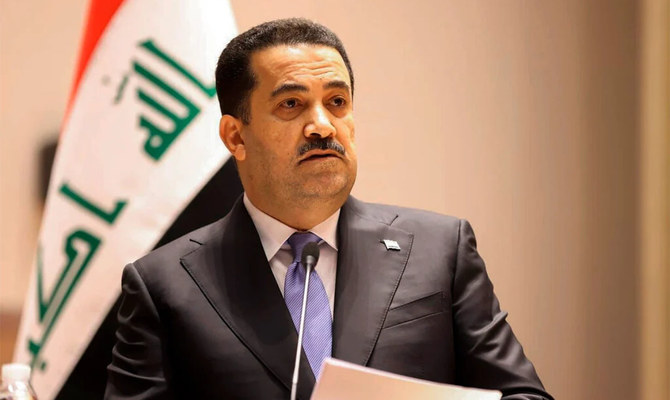BAGHDAD: Iraq’s premier said Tuesday that new banking regulations had revealed fraudulent dollar transactions made from his country, as the fresh controls coincide with a drop in the local currency’s value.
Iraq has in recent months been making efforts to ensure its banking system is compliant with the international electronic transfer system known as SWIFT.
Referring to the new controls, Prime Minister Mohammed Shia Al-Sudani hailed “a real reform of the banking system,” but denounced “falsified invoices, money going out fraudulently,” in particular as foreign currency payments for imports.
“That is a reality,” he said in an interview on state television.
The adoption of the SWIFT system was supposed to allow for greater transparency, tackle money laundering and help to enforce international sanctions, such as those against Iran and Russia.
An adviser to Sudani had said that since mid-November, Iraqi banks wanting to access dollar reserves stored in the United States must make transfers using the electronic system.
The US Federal Reserve will then examine the requests and block them if it finds them suspicious.
According to the adviser, the Fed had so far rejected 80 percent of the transfer requests over concerns of the funds’ final recipients.
Before the introduction of the new regulations, “we were selling $200 million or $300 million a day,” Sudani said.
“Now, the central bank provides $30 million, $40 million, $50 million,” he said, questioning: “What were we importing in a single day for $300 million?“
“There are products that were entering (Iraq) for prices that make no sense. Clearly, the objective was to take foreign currency out of Iraq,” he said. “This must stop.”
Money may have been transported to Iraq’s autonomous Kurdistan province “and from there to neighboring countries,” Sudani said, without specifying whether he was referring to Turkiye, Iran or war-torn Syria.
He said the new controls had been planned for two years, in accordance with an agreement between Iraq’s central bank and US financial authorities, and deplored previous failures to put them in place.
Iraq, which is trying to move past four decades of war and unrest, is plagued by endemic corruption.
The official exchange rate is fixed by the government at 1,470 dinars to the dollar, but the currency was trading at around 1,680 on Tuesday on unofficial markets amid dollar scarcity.
The drop has sparked sporadic protests by Iraqis worried about their purchasing power.
Foreign Minister Fuad Hussein and the new central bank chief will be among a delegation traveling to Washington on February 7 to discuss the new mechanism and the fluctuating exchange rate, Sudani said.
Iraqi PM says banking reforms reveal fraudulent dollar transactions
https://arab.news/jurub
Iraqi PM says banking reforms reveal fraudulent dollar transactions

- Iraq has in recent months been making efforts to ensure its banking system is compliant with the international electronic transfer system known as SWIFT
Erdogan says Turkiye can ‘crush’ all terrorists in Syria

Speaking in parliament, Erdogan said the Kurdish YPG militia was the biggest problem in Syria now after the ousting of former President Bashar Assad, and added that the group would not be able to escape its inevitable end unless it lays down its arms.
World must keep pressure on Israel after Gaza truce: Palestinian PM

OSLO: The international community will have to maintain pressure on Israel after an hoped-for ceasefire in Gaza so it accepts the creation of a Palestinian state, Palestinian Prime Minister Mohammed Mustafa said on Wednesday.
A ceasefire agreement appears close following a recent round of indirect talks between Israel and Hamas, with US Secretary of State Antony Blinken saying late Tuesday that a deal to end the 15-month war was “on the brink.”
“The ceasefire we’re talking about ... came about primarily because of international pressure. So pressure does pay off,” Mustafa said before a conference in Oslo.
Israel must “be shown what’s right and what’s wrong, and that the veto power on peace and statehood for Palestinians will not be accepted and tolerated any longer,” he told reporters.
He was speaking at the start of the third meeting of the Global Alliance for the Implementation of the Two-State Solution to the Israeli-Palestinian Conflict, gathering representatives from some 80 states and organizations in Oslo.
Norwegian Foreign Minister Espen Barth Eide, the host of the meeting, said a “ceasefire is the prerequisite for peace, but it is not peace.”
“We need to move forward now toward a two-state solution. And since one of the two states exists, which is Israel, we need to build the other state, which is Palestine,” he added.
According to analysts, the two-state solution appears more remote than ever.
Prime Minister Benjamin Netanyahu, firmly supported by US President-elect Donald Trump, is opposed to the creation of a Palestinian state.
Israel is not represented at the Oslo meeting.
Norway angered Israel when it recognized the Palestinian state, together with Spain and Ireland, last May, a move later followed by Slovenia.
In a nod to history, Wednesday’s meeting was held in the Oslo City Hall, where Yasser Arafat, Yitzhak Rabin and Shimon Peres received the Nobel Peace Prize in 1994.
The then-head of the Palestinian Liberation Organization, Israeli prime minister and his foreign minister were honored for signing the Oslo accords a year earlier, which laid the foundation for Palestinian autonomy with the goal of an independent state.
Syrians in uproar after volunteers paint over prison walls

DAMASCUS: Families of missing persons have urged Syria’s new authorities to protect evidence of crimes under president Bashar Assad, after outrage over volunteers painting over etchings on walls inside a former jail.
Thousands poured out of prisons after Islamist-led rebels toppled Assad last month, but many Syrians are still looking for traces of tens of thousands of relatives and friends who went missing.
In the chaos following his ouster, with journalists and families rushing to detention centers, official documents have been left unprotected, with some even looted or destroyed.
Rights groups have stressed the urgent need to preserve “evidence of atrocities,” which includes writings left by detainees on the walls of their cells.
But a video appearing to show young volunteers paint over such writings at an unnamed detention center with white paint and adorning its walls with the new Syrian flag, the depiction of a fireplace or broken chains has circulated on social media in recent days, angering activists.
“Painting the walls of security branches is disgraceful, especially before the start of new investigations into human rights violations” there, said Diab Serriya, a co-founder of Association of Detainees and Missing Persons of Saydnaya Prison (ADMSP).
It is “an attempt to destroy the signs of torture or enforced disappearance and hampers efforts to... gather evidence,” he said.
Jomana Hasan Shtiwy, a Syrian held in three different facilities under Assad, often changing cells, said the writings on the walls held invaluable information.
“On the walls are names and telephone numbers to contact relatives and inform them about the fate of their children,” she said on Facebook.
In each new cell, “we would write a memory so that those who followed could remember us,” she said.
A petition appeared on Tuesday calling for the new Syrian authorities to better protect evidence, and give investigating the fate of those forcibly disappeared under Assad “the highest priority.”
It slammed what it called “the insensitive treatment of the sanctity” of former detention centers.
“Some have gone as far as to paint cells, obscuring their features, which for us represents... a great wronging of detainees,” said signatories, including ADMSP.
The president of the International Committee for the Red Cross said last week determining the fate of those who went missing during Syria’s civil war would be a “huge challenge.”
Mirjana Spoljaric said the ICRC was following 43,000 cases, but that was probably just a fraction of the missing.
The Syrian Observatory for Human Rights, a Britain-based war monitor, says more than 100,000 people have died in detention from torture or dire health conditions across Syria since 2011.
Iran’s navy unveils its first signals intelligence ship

DUBAI: Iran’s navy received its first signals intelligence ship on Wednesday, semi-official Tasnim news organization reported, a few days after the country’s army took delivery of 1,000 new drones.
The Zagros is a new category of military vessel equipped with electronic sensors and the ability to intercept cyber-operations and conduct intelligence monitoring, Tasnim said.
“The Zagros signals intelligence ship will be the watchful eye of Iran’s navy in the seas and oceans,” Navy Commander Shahram Irani said.
Earlier this month, Iran started two-month-long military exercises which have already included war games in which the elite Revolutionary Guards defended key nuclear installations in Natanz against mock attacks by missiles and drones.
The military drills and procurement come at a time of high tensions with arch-enemy Israel and the United States under incoming US president Donald Trump.
In October, the spokesperson of Iran’s government said the country plans to raise its military budget by around 200 percent to face growing threats.
Palestinian Islamic Jihad official says joined Gaza prisoner swap talks in Qatar

GAZA: An Islamic Jihad official told AFP on Wednesday that a delegation from the Palestinian militant group had arrived in Qatar to participate in talks on a Gaza truce and prisoner exchange with Israel.
“A high-ranking delegation from Islamic Jihad arrived in Doha on Tuesday evening,” said the official, speaking on condition of anonymity as he was not authorized to publicly discuss the talks, adding that “discussions are ongoing, focusing on the mechanism for implementing the ceasefire agreement and the names of Palestinian prisoners included in the exchange deal.”
















